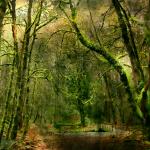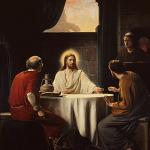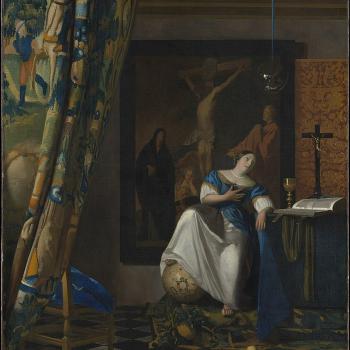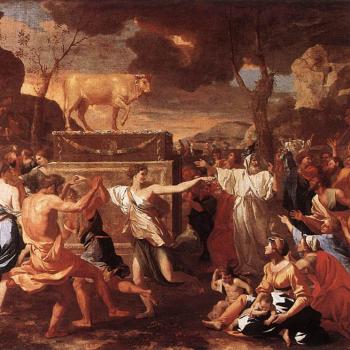“Now Lazarus was sick.” I doubt there is a one of us who has not experienced the sickness, even to death, of one we love. There’s a unique agony that goes with watching someone you love suffer and know that he or she is slipping from your grasp. That agony was Martha’s and Mary’s. And, of course, it was Jesus’ agony, too. We like to think that, knowing what he had in mind, knowing he could speak a word and erase the whole nightmare, knowing that Lazarus’ story wasn’t going to end here, he could shrug off the loss, even perhaps anticipate with some glee the act of restoring him to health and family.
“Lazarus is dead.” So Jesus speaks plainly to the disciples. And how did he know this? A message had reached him about Lazarus’ illness, but Jesus dilly-dallied, letting two more days go by. And then, he knew. Somehow, he knew. But he returned with the same feelings of dread, of desperate horror and grief that seize us all when we face the great, gaping abyss of death. We see Jesus seized with anguish as he enters into the sisters’ weeping and follows them to the tomb.
And here we enter the scene so powerfully painted in the 1870s by Carl Bloch, a Danish artist. Everyone in the painting is fixated on that rift of darkness where only memories have any meaning. Martha crouches at Jesus’ knees; Mary peers from behind him. Strong men pull off the door; a pious elder stands a bit back, leaning on his left foot as though prepared for a quick retreat; a small child, terrified, hides behind him.
Jesus speaks, and stretches out his hand to the corpse within. Light shines out from Jesus, fading into all the edges of the painting. The red of his robe foretells of his blood, so soon to be shed after this event; Lazarus’ death is the beginning of Jesus’ own journey to the tomb for, according to John’s gospel, the living-dead-living Lazarus was the last straw for his enemies. “If we let him go on like this, everyone will believe in him…” (Indeed; would that they did.) The white of Jesus’ robe foretells his victory over his own tomb and over all tombs.
Bloch paints the scene in twilight; the darkening blue of the sky and the shadowed hills in the background leave the viewer with the feeling that it has been a long day, full of the exhausted sobbing that comes with great grief, when hope has dwindled to a barely remembered glimmer, a crushed wish. We know that feeling, even when it hasn’t involved physical death—our deepest longings abandoned, a dreary future, compounded anxieties, dreams dead, hard realities accepted with a battered heart.
But here, in this scene, we’re frozen in the moment Jesus speaks: “Lazarus, come out!” We can barely see the dead man, just a dark hint of his shadowed face. It’s as though Bloch is forcing us to wait, breathless, on the man’s response. Will he? Won’t he?
We are Mary and Martha in their stupefied loss, certainly. We are the pious elder, doubtful and jaded in our disbelief. We are the frightened child, hiding behind our religious leaders. We are the laborers, just doing as we’re told. But mostly, of course, we are Lazarus, truly dead, without a flicker of life. And then comes the voice of Jesus. His word both invites and commands. Without it, we remain behind the stone, cold and dark. Until Jesus calls us by name, we are indeed dead in sin, buried in the darkness of this world, wrapped tightly with the shrouds of this world’s corruption and sin’s deceitfulness. And we stupidly think the tomb is life.
“Come out!” Jesus is standing there, hand outstretched. It is your name he calls. The light is blinding—our drowsy eyes are used to the dark; the fresh air hits our faces—we’ve long breathed the staleness of our unrepentant ways; that Voice, saying our name, echoes in our waking dreams—in the warmth of the sun, in the song of praise, in the flicker of prayer in our hearts, in the kind word, in every good meal, in acts of gentleness, in twinges of holy guilt, in the unexpected grace, in the pastor’s Amen.
Come, come into the day; come out of the cold, dank, dark nothingness into real life and light. Breathe. Be free. Awake, oh sleeper, and rise from the dead, and Christ will shine on you. Will you? Won’t you?
Image public domain














